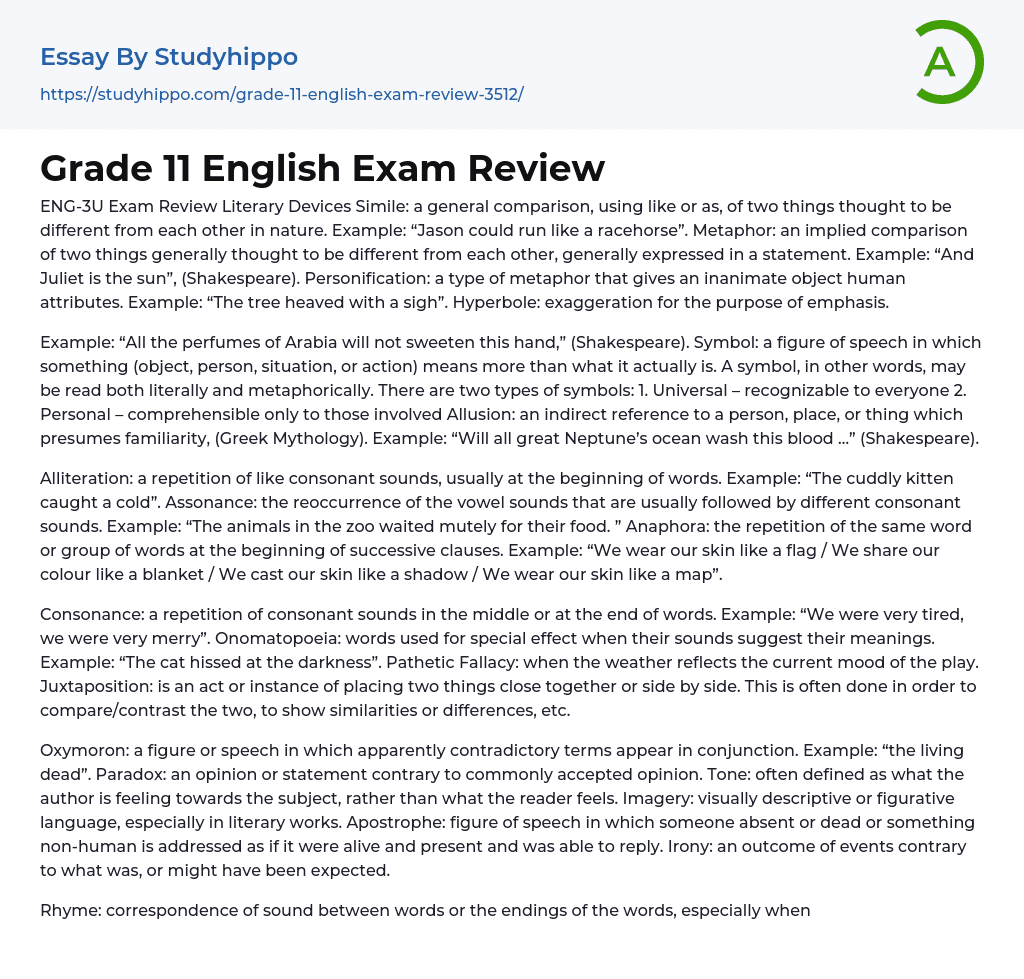ENG-3U Exam Review Literary Devices Simile: a general comparison, using like or as, of two things thought to be different from each other in nature. Example: “Jason could run like a racehorse”. Metaphor: an implied comparison of two things generally thought to be different from each other, generally expressed in a statement.
Example:
- “And Juliet is the sun”, (Shakespeare). Personification: a type of metaphor that gives an inanimate object human attributes. Example: “The tree heaved with a sigh”. Hyperbole: exaggeration for the purpose of emphasis.
Example:
“All the perfumes of Arabia will not sweeten this hand,” (Shakespeare). Symbol: a figure of speech in which something (object, person, situation, or action) means more than what it actually is. A symbol, in other words, may be read both literally and metaphorically. There are two types of symbols: 1. Universal – recognizable
...to everyone 2. Personal – comprehensible only to those involved Allusion: an indirect reference to a person, place, or thing which presumes familiarity, (Greek Mythology).
Example:
“Will all great Neptune’s ocean wash this blood …” (Shakespeare).
Alliteration: a repetition of like consonant sounds, usually at the beginning of words. Example: “The cuddly kitten caught a cold”. Assonance: the reoccurrence of the vowel sounds that are usually followed by different consonant sounds.
Example:
“The animals in the zoo waited mutely for their food. ” Anaphora: the repetition of the same word or group of words at the beginning of successive clauses.
Example:
“We wear our skin like a flag / We share our colour like a blanket / We cast our skin like a shadow / We wear our skin like a map”.
Consonance: a repetition of consonant sounds in the middle or at the end of words.
Example:
“W
were very tired, we were very merry”. Onomatopoeia: words used for special effect when their sounds suggest their meanings. Example: “The cat hissed at the darkness”. Pathetic Fallacy: when the weather reflects the current mood of the play. Juxtaposition: is an act or instance of placing two things close together or side by side. This is often done in order to compare/contrast the two, to show similarities or differences, etc.
Oxymoron: a figure or speech in which apparently contradictory terms appear in conjunction. Example: “the living dead”. Paradox: an opinion or statement contrary to commonly accepted opinion. Tone: often defined as what the author is feeling towards the subject, rather than what the reader feels. Imagery: visually descriptive or figurative language, especially in literary works. Apostrophe: figure of speech in which someone absent or dead or something non-human is addressed as if it were alive and present and was able to reply. Irony: an outcome of events contrary to what was, or might have been expected.
Rhyme: correspondence of sound between words or the endings of the words, especially when these are used at the end of lines in poetry. Shakespearean Theatre Terms: Blank Verse: verse without rhyme, especially that which uses iambic pentameter. Aside: a remark by a character in a play intended to be heard by the audience but not by the other characters. Soliloquy: an act of speaking one’s thoughts aloud when by oneself or regardless of any hearers, especially by a character in a play. Dramatic Irony: irony that occurs when the meaning of the situation is understood by the audience but not by the characters in the play.
Rhyming Couplet: pair of lines
of meter in poetry. It usually consists of two lines that rhyme and have the same meter. Motifs: a recurring subject, theme, idea, etc. especially in a literary, artistic, or musical work. Characteristics of the archetypical tragic hero: 1. Noble Stature 2. Tragic Flow 3. Reversal of Fortune 4. Increased awareness 5. Emotional release in the audience Great Chain of Being in Shakespearean Society: 1. King/Church 2. Nobles 3. Guilds 4. Peasants Great Change of Being for Family: 1. Father 2. Son 3. Mother 4. Daughter
- Allegory essays
- Alliteration essays
- Comedy essays
- Comic book essays
- Drama essays
- Dystopia essays
- Fairy Tale essays
- Fantasy essays
- Fiction essays
- Ghost essays
- Gothic Fiction essays
- Gothic Literature essays
- Irony essays
- Legend essays
- Memoir essays
- Novel essays
- Poetry essays
- Satire essays
- Science Fiction essays
- Short Story essays
- The western essays
- Tragedy essays
- Witchcraft essays
- American Literature essays
- Between The World and Me essays
- Book Report essays
- Book Review essays
- Book Summary essays
- Books essays
- Character essays
- Coming of Age essays
- Dante's Inferno essays
- Everyday Use essays
- Flowers for Algernon essays
- Genre essays
- Greek Mythology essays
- Incidents in The Life of a Slave Girl essays
- Letter essays
- Literary Criticism essays
- Literary devices essays
- Literature Review essays
- Metaphor essays
- Myth essays
- Play essays
- Plot essays
- Poem essays
- Poetry Analysis essays
- Protagonist essays
- Reader essays
- Reason essays




